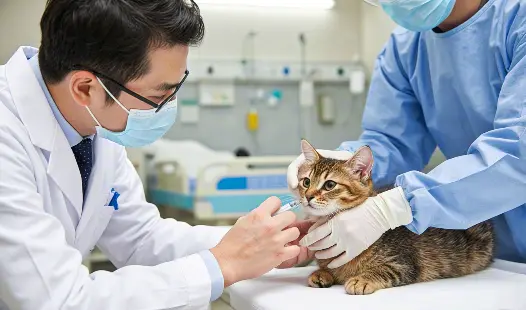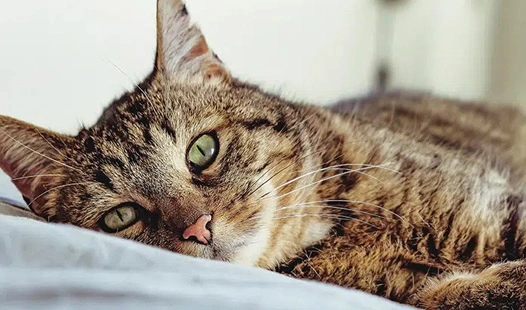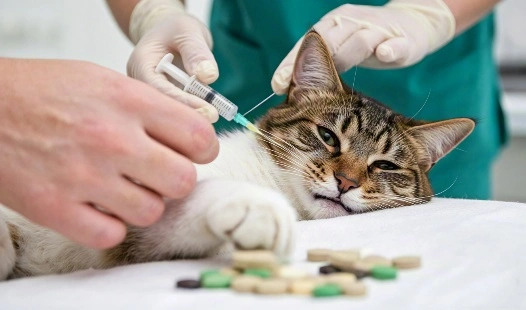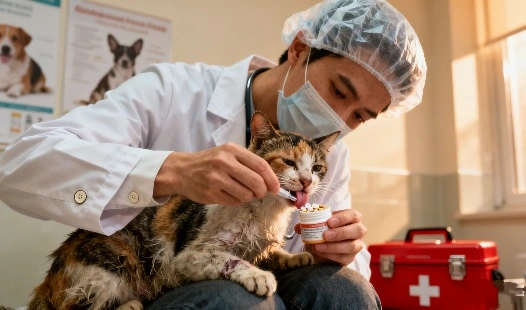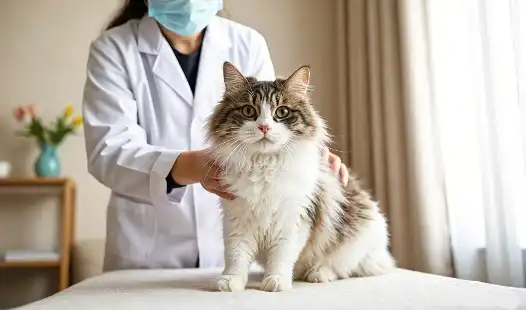Dietary Adjustment Guide for Cats with FIP
Essential Nutrients for Fighting FIP
Complete care is necessary for cats with Feline Infectious Peritonitis (FIP), which includes maintaining a healthy diet and adhering to other FIP care protocols. During their treatment and rehabilitation, cats with FIP need special attention to their diets, and this guide will help you manage those demands. When it comes to strengthening the immune system, owners should prioritise foods that are high in protein and necessary vitamins, in addition to giving balanced meals. Additional factors that might enhance results include staying hydrated, choosing foods that are easy to digest, and taking any supplements prescribed by vets. Your cat's recovery path may be made more comfortable and less stressful by integrating dietary methods with careful FIP care. This will help your cat heal faster and feel better overall.
|
|
|
Essential Nutrients for Fighting FIP
When caring for a cat with FIP, providing the right nutrients is crucial for supporting their immune system and overall health through consistent FIP care. Here are some key nutrients to focus on, including high-quality proteins, essential fatty acids and antioxidants that can strengthen recovery.
Protein: The Building Block of Recovery
High-quality protein is one of the most critical nutrients for cats battling FIP, as it serves as the foundation for repairing tissues, maintaining lean muscle mass, and supporting immune system activity. Cats are obligate carnivores, which means their bodies rely heavily on protein for proper metabolic function. When dealing with illness, their protein requirements can be even higher, making easily digestible sources such as chicken, turkey, or fish excellent choices. Providing a consistent intake of protein also prevents muscle wasting, which is a common issue in chronically ill cats. Including a variety of lean meats and monitoring protein digestibility ensures that the cat receives optimal nourishment, strengthening resilience and aiding recovery during FIP care.
Omega-3 Fatty Acids: Natural Anti-Inflammatories
Omega-3 fatty acids, particularly EPA and DHA, play a valuable role in reducing the inflammation commonly associated with FIP. Chronic inflammation can worsen symptoms, weaken the immune response, and damage tissues, making these healthy fats essential for managing the disease. Fish oil derived from salmon, sardines, or krill provides a concentrated source of Omega-3s, while algae-based supplements are a good plant alternative. Incorporating them into the diet helps regulate inflammatory pathways, improve coat and skin health, and support joint function, which can be beneficial for overall comfort. By minimizing inflammation, Omega-3 fatty acids allow the cat's body to focus more effectively on fighting the virus, promoting healing, and improving quality of life during treatment.
Antioxidants: Boosting Immune Function
Antioxidants such as vitamins C and E, along with beta-carotene, are crucial in protecting a cat's body from oxidative stress, which can occur when battling FIP. Oxidative stress weakens the immune system and contributes to cellular damage, but antioxidants help neutralize harmful free radicals, reducing this burden. Cats with FIP can benefit from diets enriched with antioxidant-rich ingredients, such as certain vegetables or fortified commercial cat foods. Supplements may also be considered under veterinary guidance, ensuring safe and appropriate dosages. Antioxidants not only protect cells but also enhance the body's ability to fight infections and recover more efficiently. Incorporating them into a comprehensive nutrition plan strengthens immune defenses, improves resilience, and supports long-term recovery as part of effective FIP care.
|
|
|
|
Meal Planning: Balancing Nutrition and Palatability
Creating a balanced meal plan for a cat with FIP requires careful consideration of both nutritional needs and palatability, which is an essential part of effective FIP care. Here's how to approach it, ensuring meals are both nourishing and appealing to support recovery and maintain strength.
Calorie Dense Foods
Cats with FIP often experience weight loss. Offer calorie-dense foods to help maintain or increase their weight. Wet foods can be particularly beneficial as they're often more palatable and provide additional hydration.
Small, Frequent Meals
Divide your cat's daily food intake into several small meals. This can help stimulate appetite and make it easier for them to consume enough calories throughout the day.
Temperature Matters
Warm food slightly to enhance its aroma and make it more appealing. However, always check the temperature before serving to avoid burns.
Variety is Key
Offer a variety of flavors and textures to prevent food aversion. This can include different proteins, wet and dry foods, and even homemade options (under veterinary guidance).
|
|
|
|
Supplements: When and How to Use
While a balanced diet should provide most nutrients, supplements can play a role in supporting cats with FIP. Here's what you need to know:
Vitamin B Complex
B vitamins support energy metabolism and can help combat anemia. Consider a B-complex supplement, especially if your cat's appetite is reduced.
Probiotics
Probiotics can support digestive health and immune function. Look for feline-specific probiotic supplements to ensure the right strains and dosages.
L-Lysine
While primarily used for herpesvirus, L-lysine may also support immune function in cats with FIP. Consult your veterinarian for appropriate dosing.
GS-441524 Injection Support
For cats undergoing GS-441524 Injection treatment, certain supplements may help support liver function and overall health. Always consult with your veterinarian before adding any supplements to your cat's regimen, especially when using GS-441524 Injection.
|
|
|
Conclusion
Proper nutrition is a critical component of FIP care. By focusing on essential nutrients, creating a balanced meal plan, and judiciously using supplements, you can support your cat's health and recovery. Remember, every cat is unique, so work closely with your veterinarian to tailor this dietary approach to your cat's specific needs.
FAQ
1. Q: How often should I feed my cat with FIP?
A: Cats with FIP often benefit from small, frequent meals throughout the day. Aim for 4-6 small meals to help maintain energy levels and stimulate appetite.
2. Q: Can I give my cat with FIP human food supplements?
A: It's best to use supplements specifically formulated for cats. Human supplements may contain inappropriate dosages or ingredients that could be harmful to cats.
3. Q: How can I encourage my cat with FIP to eat more?
A: Try warming food slightly to enhance aroma, offer a variety of flavors and textures, and consider hand-feeding or using appetite stimulants as recommended by your veterinarian.
Elevate Your Cat's FIP Care with BLOOM TECH's Premium GS-441524
Nutrition and therapy are two of the most important aspects of FIP care, and we at BLOOM TECH know this. To guarantee the best quality and effectiveness for your feline friend, we produce our pharmaceutical-grade GS-441524 Injection according to stringent GMP standards. Our trustworthy solution offers doctors and cat owners a fighting chance against FIP, thanks to our dedication to quality and more than a decade of expertise in organic synthesis. For more information on how our products can support your cat's FIP treatment, please contact us at Sales@bloomtechz.com. Trust BLOOM TECH, your partner in feline health and GS-441524 manufacturer.
References
1. Smith, J.A. et al. (2022). "Nutritional Management of Cats with Feline Infectious Peritonitis." Journal of Feline Medicine and Surgery, 24(5), 423-435.
2. Johnson, L.R. (2021). "Dietary Considerations in FIP Treatment: A Comprehensive Review." Veterinary Clinics of North America: Small Animal Practice, 51(3), 675-690.
3. Pedersen, N.C. (2023). "Advances in FIP Treatment: The Role of Nutrition and GS-441524." Journal of Veterinary Internal Medicine, 37(2), 512-525.
4. Thompson, K.L. et al. (2022). "Supportive Care for Cats Undergoing GS-441524 Treatment: A Clinical Perspective." Veterinary Therapeutics, 23(4), 287-301.

Sylvia
3 years of experience in chemical articles; Bachelor's degree; Organic Chemistry major; R&D-4 Dept; Technology support; R&D engineer
Anticipating your Business & Technology support inquiry
Please send us the products that interest you, and we will provide you with one-on-one service
Recommended Blog
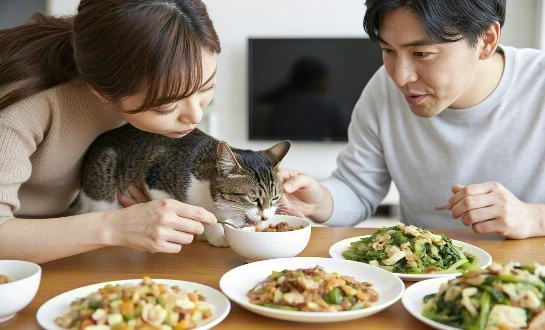
Cat Won't Eat During GS-441524 Treatment? 4 Ways to Stimulate Their Appetite
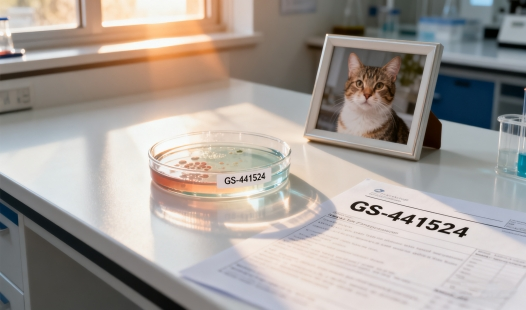
What are the differences in treatment for wet and dry FIP?
_副本_1757905577235.webp)
The Molecular Mechanism of GS-441524: How It Fights Coronavirus












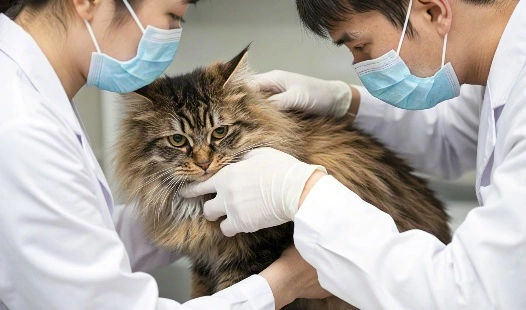
_副本_1758508468100.webp)
